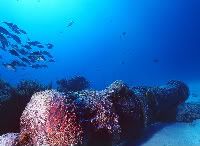Island Nations Are a Good Fit for Renewable Energy
Don Harmon of LiFeBatt, a long-time 2GreenEnergy reader, writes in about my recent video on clean energy:
Good interview. We are currently working on a project in the Caribbean Islands for solar and wind generation. The islands are a very ripe opportunity now for implementing green energy because they are mostly dependent on buying diesel fuel from Hugo Chavez in Venezuela and the cost is atrocious. So, may we see these islands go green way before the U.S. does? Since there is virtually no infrastructure, we have a blank slate to work with, and of course battery storage backup will be a key ingredient.
Thanks, Don. Yes, I think we’ll absolutely see this, for the reasons you name and more.
1) The price of diesel is bad and getting worse.
2) Having all one’s eggs in one basket, in this case, diesel, has hugely negative implications to national security.
3) Having a blank slate means not abandoning existing as-yet-to-be-depreciated assets in terms of investments/infrastructure.
4) Island nations can be corrupt, but at least it’s not corruption built out into a super-bloated bureaucracy like ours.
5) The warmer the surface waters, the more potential ocean thermal has – and OTEC is baseload (24X7).
6) Ocean current is also a possibility for island nations near large, steady currents, e.g., the Gulf Stream and the Mozambique Current.
7) The intermittencies of solar and wind aren’t as important, since some of these nations are densely populated, and don’t have the land mass for solar anyway. Bermuda is a great example. They’d need almost a square mile of PV to replace their diesel generators, but the land mass simply isn’t there. I’m good at using prefixes like mega, giga, and tera, but I can’t imagine what a square mile of Bermuda is worth; it’s gigadollars, to be sure.
8) There is some serious money laying around some of these islands. Bermuda’s another good example. Their population of 68,000 or so is one of the wealthiest in the world per capita, and they’re really tired of watching the smoke rise up out of those chimneys, and dumping particulate exhaust all over the island.
Thanks again for writing.


There are much smaller islands than Bermuda who also have a lot of money coming in from Vacation home buyers who are wealthy and want a clean energy source. For what Chavez charges for his diesel fuel to run their generators a clean green energy solution is already at hand now.
Another example of where renewable energy sources would be helpful is Fiji.
The largest Fiji island is Viti Levu. It gets much of its power from a hydro system, but there isn’t always enough water so it has to be backed up with Diesel power which is very expensive. There is some wind power in use, but because of the frequency of hurricanes, the wind generators are of the tilt-up type so they can be lowered to prevent damage by hurricanes. The economics of wind generators small enough to be of the tilt-up type are at best questionable. One would think that solar might be better.
There are also remote areas in Fiji that will not be connected to the grid in the foreseeable future. Some such areas are powered for a few hours a day by Diesel generators which are extremely expensive to operate. They are moving towards PV power which is probably reasonable under the circumstances even though PV provides only intermittent power.
There are other Pacific island nations where renewables would be practical, such as Tong and Vanuatu. Let us hope that further development will make them more practical and economical.
I continue to believe that renewable sources of power are not practical to meet the energy requirements of large countries and that there is little choice but to shift from fossil fuels to nuclear power in large countries. However, there are circumstances where renewable power is better than the alternatives, as I have stated above.